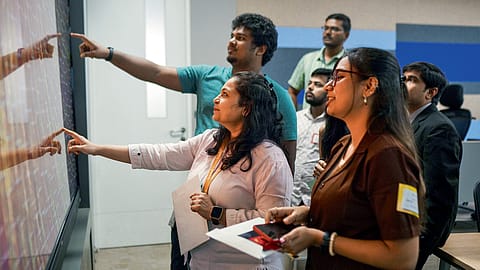Diversity Key to Fractal’s Policies
Besides having more women, those from LGBTQ+ community in the workforce, the analytics firm focuses on creating a culture of acceptance for neurodivergent employees and those with special needs.

This story belongs to the Fortune India Magazine April 2023 issue.
ARTIFICIAL INTELLIGENCE and analytics firm Fractal Analytics finds itself in the face of uncertainty yet again. The economies of the West, including the U.S. and major European nations, are headed towards a recession. Layoffs across big tech firms is a reality staring in the face.
“The environment is evolving. There is no telling how all of this is going to unfold,” says Rohini Singh, chief people officer at Fractal. She allays fears of the layoff axe falling on Fractal. “We have decided not to lay off anyone. We will take a long-term view on talent.” If the business suffers in a deteriorating business environment, the company would focus on talent by upskilling or reskilling them, adds Singh. In fact, the company is also ‘cautiously optimistic’ about hiring people. “We continue to see demand and growth in the line of business we are in. But we are cautious of who we are hiring, how many we are hiring, and for what we are hiring,” says Singh.
The Mumbai-founded and New York-based company is applying the lessons it learned during Covid. It also pre-empted the use of emerging technology in its day-to-day affairs, and first started experimenting with Cloud in its R&D projects as early as 2009. This reaped benefits, as several companies were coerced into migrating to Cloud-based services hastily to collaborate better during the pandemic. From Day One of the pandemic, the aim was to promote a flexible working set-up, and the company activated the ability to work and collaborate from anywhere across the globe. “We had flexible, remote-working options almost a decade before Covid-19 struck, and we continue to offer that flexibility,” says Singh.
“We took a very conscious call to stay true to who we are (during the pandemic). We took a people-first approach, not rescinding offers to campus hires, or hiring with salary cuts. We have made it public to all employees that there is a high amount of job security here,” she adds.
Diversity, equality, and inclusion continue to remain the cornerstone of Fractal. The company currently has 32% women in its offices across the globe, and plans to increase this number to 45% by 2026. It is taking up specific initiatives for this purpose, including hiring from women-majority campuses, running campaigns on women role models, and inviting applications from women. “We have pay parity and are committed to measuring the gender pay gap and eliminating it, should it ever occur,” says Singh. While it currently has 21% women in leadership roles, it is looking to increase that number to 40% by 2026.
However, having more women in workforce is not all there is to diversity. The company is instituting a culture of belongingness for the LGBTQ+ community. “We believe people should be able to feel comfortable in their immediate environment, are able to bring their whole selves to work, and get accepted for who they are. They should not feel any stigma or discrimination,” says Singh. The company is looking to set up an Employee Resource Group (ERG) this year for the LGBTQ+ community. “We are also looking to make concerted, specific, hiring efforts. Representation matters a lot. We have some people at Fractal who identify and are members of the LGBTQ+ community,” she adds.
Fractal is also working on creating a culture of acceptance and belonging for its neurodivergent employees, or those with special needs. “We do not see neurodivergence as a barrier which can get in the way of their work,” says Singh, adding, the company believes in people bringing the same kind of diversity to the table. “When we have applications from people with neurodivergence, or when we go to campuses and come across applicants with neurodivergence, what we are careful about in ensuring the assessment process, the kind of role, and the training and sensitisation in the teams they are going to work in. It is something we look at and have conversations about,” she adds. Inclusion is not a one-size-fits-all approach. “There are different strokes for different folks,” says Singh.
More Stories from this Issue
The major tenets on which the company’s philosophy rests are transparency, trust, and freedom. At townhall meetings, people across designations open up about their experiences.
“We have had townhall meetings where people have stated openly that they belong to the LGBTQ+ community, and these meetings have voiced the existence of a safe space to people for sharing their experiences and grievances,” says Singh. It is in these townhalls that employees have also shared their tryst with mental health, and their journey towards combating those issues. According to Singh, these townhalls have helped foster a culture that destigmatises the LGBTQ+ community or neurodivergent people.
Fractal works with employees to unlearn the inherent biases that they may have subconsciously nursed due to their upbringing. “We are inculcating a practice where we use gender-neutral pronouns, when we are giving an example, for instance, and avoid using masculine pronouns,” says Singh. But she concedes it is a tall order to make the organisation completely free of internal biases. “There is a long way to go, and it may require decades to bring about that change. We are taking one step at a time,” she says.